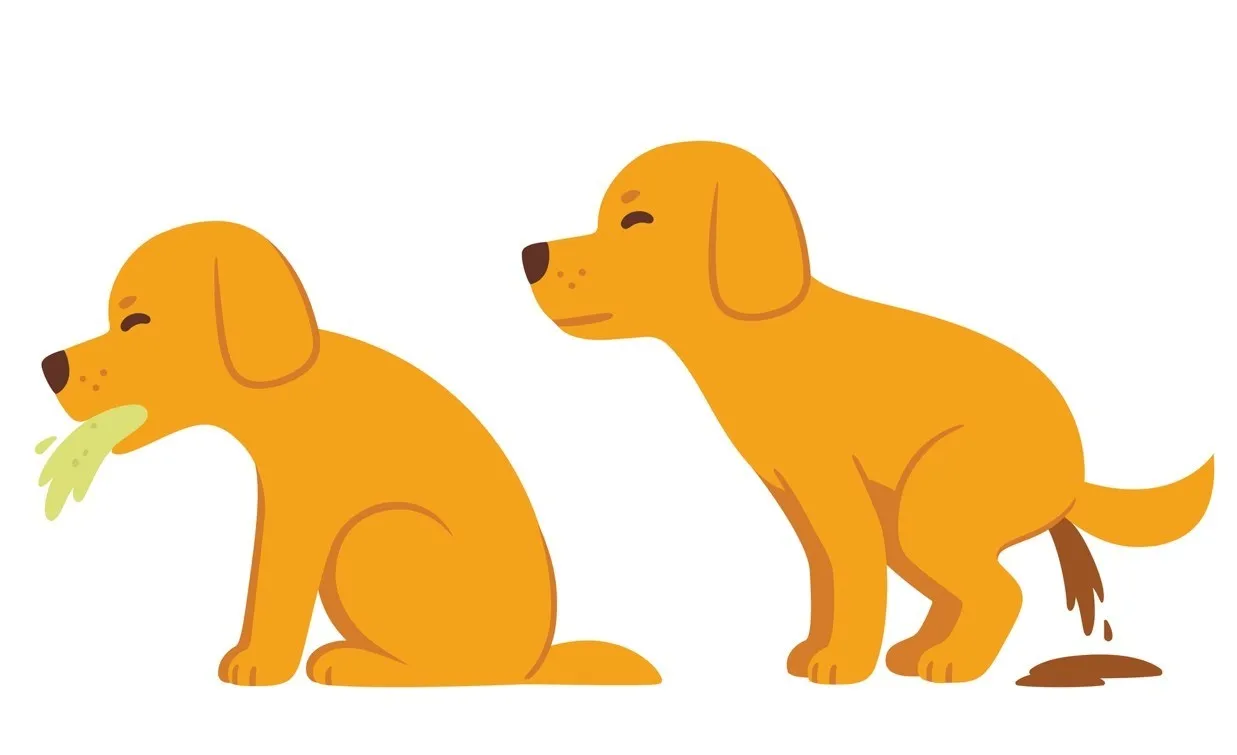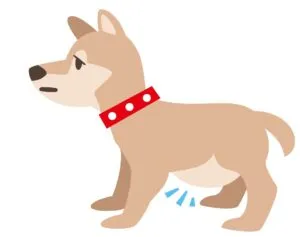Intestinal parasites, commonly known as worms, are an unwelcome but often unavoidable part of owning a dog. These creatures vary in type and can significantly disrupt your pet’s health and development. Moreover, if your dog contracts intestinal worms, they can potentially spread the infection to other vulnerable pets. A crucial question many pet owners ask is, Can Worms Cause Upset Stomach In Dogs? The answer is a resounding yes, and understanding the signs is key to early intervention.
Recognizing the most common symptoms of parasitic infection is vital for pet owners to know when to seek veterinary guidance and care. Fortunately, with veterinarian-prescribed treatments, strict hygiene practices, and proper pet waste removal, intestinal parasites are generally manageable. Once your dog has been dewormed, ongoing parasite prevention, including a monthly broad-spectrum dewormer and biannual fecal tests, can significantly reduce their risk of future infections. For more information on preventing external parasites, you can learn about lice in dogs how to get rid of it. Let’s explore the key indicators that suggest your dog might be suffering from intestinal worms, particularly those affecting their digestive system.
Understanding Intestinal Worms and Their Impact on Your Dog’s Digestion
Worms are a common cause of gastrointestinal upset in dogs. Different types of worms, such as roundworms, tapeworms, whipworms, and hookworms, can infest a dog’s digestive tract, leading to a range of uncomfortable symptoms. These parasites can irritate the intestinal lining, interfere with nutrient absorption, and in severe cases, cause blockages, all of which contribute to an upset stomach. Identifying which type of worm might be affecting your dog often starts with observing their stool and overall behavior.
Visible Signs of an Upset Stomach Caused by Worms
Visible Worms in Stool: A Clear Indicator
Seeing worms in your dog’s stool is one of the most immediate and alarming signs for any pet owner. Two common worm species you might observe in infected pet feces are roundworms (Toxocara spp.) and tapeworms (Dipylidium caninum). Roundworms typically resemble strands of spaghetti, while segmented tapeworms – which are actually egg packets rather than full worms – look like small grains of rice. Both roundworms and tapeworm segments are frequently found in feces. Tapeworm segments, however, may also be seen in the fur around your dog’s anus or beneath their tail, often indicating an itchy rear end.
 Roundworms and tapeworm segments in dog stool
Roundworms and tapeworm segments in dog stool
Diarrhea: A Common Symptom of Gastrointestinal Irritation
Diarrhea is a very common symptom of an upset stomach caused by intestinal parasites. Whipworms (Trichuris vulpis) are known to reside in the junction between the small and large intestines, and the colon. These parasites specifically irritate the colon lining, leading to watery diarrhea that can sometimes be bloody or mucoid (containing mucus). Beyond worms, other single-celled intestinal parasites like Giardia and coccidia are also frequent culprits behind parasite-induced diarrhea, further contributing to a dog’s stomach upset. This irritation, inflammation, and damage to the intestinal walls prevent proper nutrient absorption, often leading to weight loss and malnutrition, particularly in affected puppies and kittens.
 Dog experiencing vomiting and diarrhea
Dog experiencing vomiting and diarrhea
Vomiting: When Worms Disrupt the Stomach
A significant worm burden can lead to considerable gastrointestinal irritation and upset, frequently causing dogs to vomit. Adult worms, especially in large numbers, can even cause a physical blockage in the intestine, leading to a backflow of stomach contents. Vomiting is often accompanied by diarrhea, and it’s not uncommon to find worms present in both the vomit and stool. It’s worth noting that mild vomiting can sometimes occur normally during veterinary-prescribed deworming treatment, as the body works to eliminate the dying parasites. If your dog is also dealing with external parasites, understanding flea and ear mite treatment for dogs can be helpful for comprehensive care.
Other Indicators of Worms Affecting Your Dog’s Health
Weight Loss Despite Healthy Appetite: Nutrient Malabsorption
As mentioned earlier, several intestinal parasites, including whipworms, hookworms, Giardia, and coccidia, are known to damage a dog’s intestinal lining. This delicate, single-cell-thick tissue is crucial for absorbing key nutrients from digested food and distributing them throughout the body. When the intestines are damaged, essential nutrients cannot be absorbed properly, causing a dog with a heavy worm burden to eat ravenously yet still lose weight. This paradoxical situation highlights the severe impact worms have on a dog’s ability to maintain a healthy body condition.
 A thin dog showing signs of weight loss
A thin dog showing signs of weight loss
Dull or Dry Coat: A Reflection of Internal Health
The condition of your dog’s skin and coat is often a direct reflection of their internal health. When intestinal parasites hinder nutrient absorption, a dog’s haircoat frequently becomes dry, brittle, or noticeably dull. Attempts to improve the coat through dietary supplements or regular grooming are typically unsuccessful until the underlying parasitic infection is treated, demonstrating the systemic impact of these internal invaders.
Scooting or Licking Hind End: Tapeworm Irritation
The rice-like segments of tapeworms (egg packets) passed in a dog’s stool can cause uncomfortable itching and inflammation around the anus. To find relief, affected dogs may scoot their hindquarters across the floor, drag their rear end, or excessively lick the area. While other conditions, such as anal sac impaction, can also cause these behaviors, a quick check beneath your dog’s tail might reveal visible tapeworm segments. It’s important to differentiate between various types of parasitic irritations, as you might wonder, for instance, can a dog get lice from a human?
 A dog with a bloated or potbellied abdomen
A dog with a bloated or potbellied abdomen
Severe Symptoms and When to Seek Veterinary Care
Bloated or Potbellied Appearance: A Sign of Heavy Infestation
Abdominal swelling or distention, often referred to as a “potbelly,” is a common sign of roundworm infection, particularly in severely affected puppies and kittens. In cases of high-volume infections, roundworms can become so numerous and large that they visibly alter a pet’s shape, creating a distinct potbellied or bloated appearance. This distention can be painful and may lead to a loss of appetite, vomiting, and even intestinal blockages, further exacerbating the upset stomach. For other parasitic concerns, you might consider if ear mites in dogs transfer to humans.
Lethargy and Weakness: The Impact of Anemia and Malabsorption
Infected dogs may appear weak, fatigued, or have significantly low energy levels. Puppies and kittens, instead of playing and interacting normally, may prefer to sleep for extended periods. This lethargy induced by intestinal parasites can stem from ongoing nutrient malabsorption, dehydration caused by persistent vomiting or diarrhea, or anemia (a low red blood cell count) resulting from hookworm infection. Hookworms (Ancylostoma spp.), as their name suggests, are toothy parasites with hook-like mouthparts that bite into and feed on the intestinal lining. These blood-sucking parasites can cause severe, life-threatening anemia in young dogs. Because red blood cells are responsible for transporting oxygen throughout the body, anemic dogs are visibly weak and lethargic.
 A lethargic cat resting, illustrating low energy
A lethargic cat resting, illustrating low energy
Prevention and When to Contact Your Vet
While discovering a few worms in your dog’s stool can be alarming, it’s not always an immediate veterinary emergency. If your dog is otherwise behaving normally, you can typically schedule a routine appointment with your regular veterinarian. However, pet illnesses don’t adhere to normal business hours, and our UrgentVet team is always available for pets who are vomiting, lethargic, uncomfortable, or experiencing severe, late-night diarrhea. It’s also reassuring to know that concerns like can dog lice live in human hair are generally unfounded, allowing you to focus on your pet’s specific needs.
 A veterinary team member interacting with a dog
A veterinary team member interacting with a dog
The UrgentVet team is equipped to assist with all your pet’s non-life-threatening after-hours needs, regardless of their perceived severity. Find an UrgentVet location near you to reserve your spot or check in online – because your pet deserves to feel better without delay.
Conclusion
In conclusion, intestinal worms are a common and impactful cause of upset stomach in dogs, manifesting through symptoms such as vomiting, diarrhea, visible worms in stool, and a general decline in health. From the initial signs of gastrointestinal distress to more severe indications like a bloated abdomen or profound lethargy caused by anemia, prompt recognition and veterinary intervention are crucial for your dog’s well-being. Regular deworming protocols and biannual fecal examinations are essential preventive measures. If you suspect your dog has worms or is experiencing an upset stomach, do not hesitate to consult your veterinarian to ensure they receive the best possible care and relief. Explore more articles on Dog Care Story for comprehensive guidance on maintaining your beloved pet’s health.
